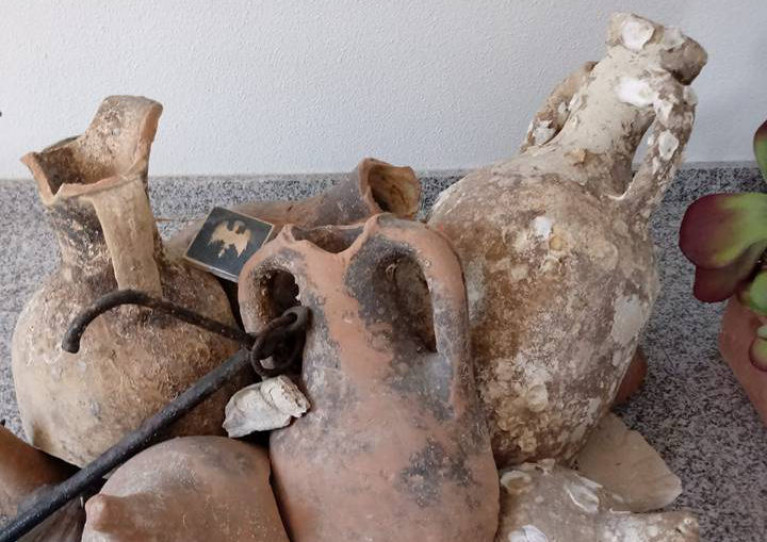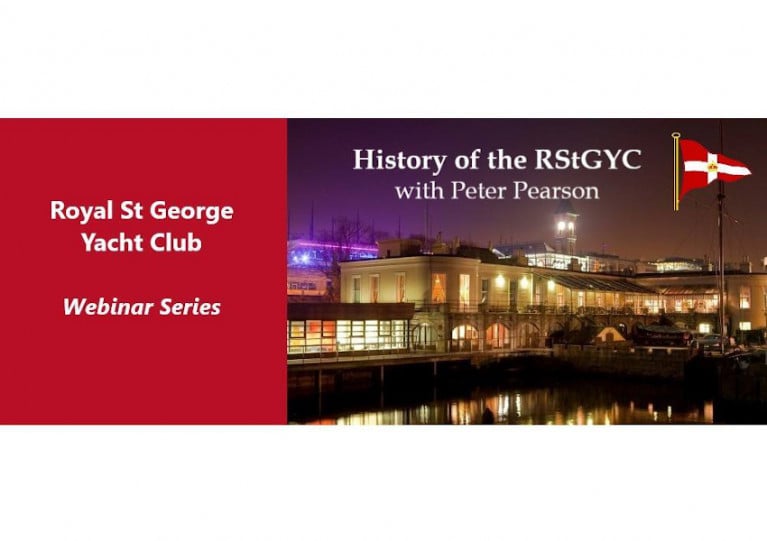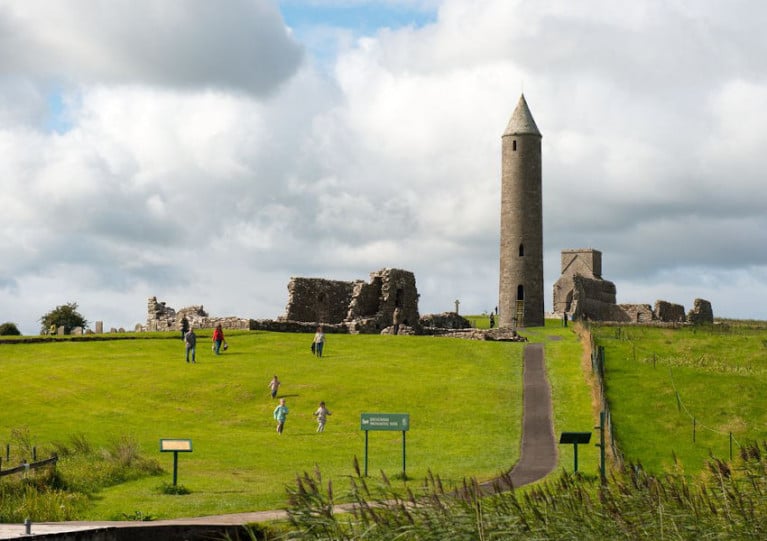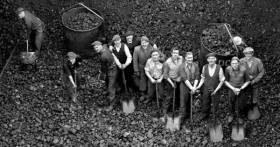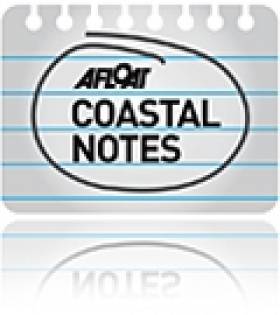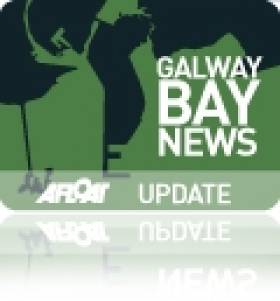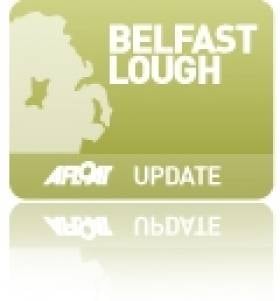Displaying items by tag: History
Fossil Sea Urchins Dating Back 350 Million Years Found Near Hook Head, Co Wexford
A group of sea urchins which died together on the seafloor almost 350 million years ago have been found in fossilised form at Hook Head, Co Wexford, by a team of scientists.
"Experts from University of Galway’s school of natural scientists led the team which recorded the fine, described as “one of the most important in Irish palaeontology in recent times”.
Sea urchins, or echinoids, are a group of marine animals, related to starfish, the scientists explain.
They have globular plated bodies covered by numerous defensive spines, which fall away after the urchin dies.
The scientists say that over 200 complete fossil echinoids are preserved in exquisite detail on a limestone surface, in an area of just one square metre.
 Detailed view of fossil sea urchins, with their spines still attached, preserved on limestone surface at Hook Head, Wexford (2 Euro coin for scale). Photo: courtesy of the Royal Irish Academy
Detailed view of fossil sea urchins, with their spines still attached, preserved on limestone surface at Hook Head, Wexford (2 Euro coin for scale). Photo: courtesy of the Royal Irish Academy
“All of the Hook Head specimens have their spines still attached, and they apparently died together on the seafloor almost 350 million years ago - a dramatic moment now frozen in time on the rock surface on the coast of south-east Ireland,” they say.
“The limestone layer containing the fossil urchins was in danger of being lost to coastal erosion, so the scientific team mounted a rescue operation to save it,” they state.
Lead author in the study, palaeontologist Dr Nidia Álvarez-Armada, said she initially discovered the fossil sea urchins on a rocky coastal outcrop when surveying the geology of Hook Head peninsula for her undergraduate Bachelor of Science thesis at University of Galway.
“ When I first noticed the echinoids on the limestone surface, I was completely astonished by both the sheer number of fossil specimens present and also their exceptional preservation,” she said.
“The significance of the find was instantly apparent, and I immediately began mapping and recording the shape, size and position of each individual urchin on the rock surface,” she said.
“ This work took several weeks to complete, but it was important to carefully document the fossil find in as much detail as possible.”
As the Hook Head is protected under law, approval for the recovery was granted by several State agencies and the local landowner.
 Rescue and recovery of the limestone slab containing the fossil sea urchins at Hook Head, Wexford. Photos: Dr Sarah Gatley, Geological Survey Ireland
Rescue and recovery of the limestone slab containing the fossil sea urchins at Hook Head, Wexford. Photos: Dr Sarah Gatley, Geological Survey Ireland
Following successful removal, the team said it “immediately entrusted the fossil-bearing slab to the National Museum of Ireland for conservation and further study”.
The discovery and recovery of the hundreds of fossil sea urchins were recently reported in the Irish Journal of Earth Sciences, published by the Royal Irish Academy.
The Hook Head fossil find is said to have the potential to reveal important information about the nature of seafloor communities during the Carboniferous - a time period that occurred “long before dinosaurs ever walked on land, when the marine realm was very different to today”.
University of Galway school of natural scientists expert Dr John Murray, who co-authored the paper and supervised the original project, said that is “quite exceptional to find Carboniferous fossil sea urchins so perfectly preserved and in such large numbers like this”.
“In life, these particular echinoids had very flexible plated bodies, covered with many spines, which usually disarticulated and dispersed rapidly after death, leaving little trace of them behind,” he said.
“ The Hook Head urchins must have been buried quite quickly after they died, with little or no post-mortem disturbance; however, it remains unclear why they congregated in such large numbers at this location on that ancient seafloor,” he said.
“The significance of this discovery was such that all of the members of the rescue team willingly volunteered their time and expertise to travel to Hook Head to help salvage the fossil-bearing slab,”Dr Murray added.
“We consciously chose to leave this important fossil find in the care of the National Museum of Ireland immediately - I guess it was our way of giving this piece of priceless geoheritage back to the people of Ireland,” he said.
The full study in The Irish Journal of Earth Sciences can be read here
Oireachtas Library Highlights Early 19th-Century Pamphlet Calling for an Irish Lifeboat Service
This month the Oireachtas Library has been displaying an 1807 pamphlet by Reverend William Liddiard (1773–1841), calling for the establishment of an organised lifeboat service along the Irish coast.
Rev Liddiard was writing in response to the sinking of two ships in Dublin Bay — the Rochdale and the Prince of Wales — which saw the loss of almost 400 lives in one night:
“I have seized the moment when the feelings of the nation are afloat, and before they can possibly be thought to have subsided, of recommending a more general establishment of the Life-boat; a plan, which affords in some degree a balm for the despondency of the moment, promising as it does to prevent a recurrence of misfortunes similar to those, which have lately gloomed our shores.”
As special collections librarian Kate McCarthy writes, it is clear from the pamphlet that Rev Liddiard was impressed with the work to develop a dedicated lifeboat service at Bamburgh Castle on the north-east coast of England.
And he was particularly keen to use the then recently constructed Martello towers as dedicated lifeboat stations in Ireland.
“However,” McCarthy adds, “it was not until 1824 that the National Institution for the Preservation of Lives and Property from Shipwreck was established for Britain and Ireland (now the Royal National Lifeboat Institution). But the sinking of the Rochdale and Prince of Wales added to a growing campaign for the development of a safe pier at the small village of Dunleary (now Dun Laoghaire).”
The Oireachtas website has more on Rev Liddiard’s pamphlet HERE.
Ancient Roman Artefacts Found In Spanish Seafood Shop
A routine inspection of a frozen seafood shop near Alicante in Spain has revealed a trove of ancient Roman artefacts, as the Guardian reports.
Objects including a number of ceramic amphoras — receptacles for carrying oil and other liquids — had been taken from the water by the owner’s son on fishing trips in the Mediterranean and used to decorate the shop in Santa Pola, it has emerged.
The items were confiscated by the authorities and examined by experts at the local Museum of the Sea, who say they likely come from shipwrecks off the eastern Spanish coast and could date back nearly 2,000 years.
The Guardian has more on the story HERE.
Royal St George Yacht Club members are invited to join Peter Pearson as he takes a journey back in time with an engaging talk about the history of the Dun Laoghaire Waterfront club.
Peter is a native of Dun Laoghaire and has had a long association with the town and harbour, producing well-known local history books such as Dun Laoghaire: Kingstown and The Forty Foot: A Monument to Sea Bathing.
The special online talk will be hosted on the Zoom platform this Thursday evening 18 June from 7.30pm. Club members can register via the link on the Facebook post HERE.
Lough Erne Locals Called To Share Folklore, Histories & Stories For Spiritual Trail Project
Shared stories of folklore and the history of spiritual sites around Lough Erne will be the subject of a public meeting at Waterways Ireland HQ in Enniskillen later this month.
Hosted by Waterways Ireland in partnership with the Lough Erne Landscape Partnership, the community outreach event encourages locals around the Fermanagh waterway to drop in and share their stories and folk tales, as well as memorabilia and photographs, that only they would have.
Doors will be open from 1pm to 8pm on Monday 27 January, with the Centre for Data Digitisation and Analysis at Queen’s University Belfast on hand to record these oral histories and more for posterity.
The project will also inform the development of the Lough Erne Spiritual Trail, an initiative of Waterways Ireland and the Lough Erne Landscape Partnership.
Eleven significant spiritual and/or ecclesiastical sites have been selected, including Devenish Island, White Island (North), Davy’s Island, Inishmacsaint, Caldragh (Boa Island), Cleenish, St. Ronan’s Aghalurcher, Galloon, Killadeas, Derryvullen and Tievealough.
Cork Calls to Remember Dockers in Regeneration Plans
In what will be a permanent reminder, EchoLive writes, are the Cork’s dockers and docking industry which is being sought as part of the area’s regeneration.
Councillor Thomas Gould has asked Cork City Council to invite submissions from the public on how the history of the trade, which has disappeared since the final rationalisation of the Port of Cork, can be remembered as part of plans to expand the city centre into brownfield sites along the quays.
The last 100 dockers in the city collected their redundancy packages in February 2009. Some had worked in the trade for almost 50 years.
A recent play on the subject of the dockers by Marion Wyatt ran to rave reviews in Cork over the summer and a second run finished this month.
For more click here.
Strong Speaker Line–Up for Irish Maritime History Conference At UCC
Following the success of last year’s inaugural maritime conference at UCC, the School of History is to hold the second annual Irish Maritime History Conference next weekend, October 16/17, exploring Ireland’s rich sea-going past and culture. Topics will include piracy, naval warfare, smuggling, fishing communities, shipwrecks, boat building and World War One on the Irish Sea.
There is a strong line-up of speakers from around the country and overseas, making for what should be a most interesting event.
Sessions will be from 1-3 pm on Friday, October 16, another from 3-7 pm and a full day on Saturday from 9-6 pm. Admission is free and no registration is required. Based on last year,.
#CoastalNotes - The history of Strangford Lough stretching back some 10,000 years is the subject of a 'spiritual motorcycle journey' by local writer Peter Moore, as the News Letter reports.
Moore, a motorbike enthusiast and archaeology graduate, hopes his new book, Valhalla and Fjörd, will inspire others to "further explore the area and enjoy the stories" relating to the "wonderful history in and around" the scenic lough.
“At the start of this journey I was unaware of just how much history there was to uncover around Strangford Lough and the fascinating stories of those that lived here over the past 10,000 years," he says of his project, which he hopes to be the first in a series of books.
Moore's journey took him on his restored Triumph motorcycle via old monastic sites, ruined abbeys and churches and other unmarked settlements around the shores of the Co Down inlet, which takes its name from the Norse for 'strong ford' after its powerful tidal currents.
The News Letter has more on the story HERE.
#GalwayBay - The discovery of deer antlers and horse bones dating back some 1,500 years at a beach on Galway Bay may reveal much about early Christian society in the region.
According to The Irish Times, the important find was made by Brian O'Carra and Mike Williams at an inter-tidal zone west of Galway city, and indicate a possible pagan ritual custom.
O'Carra and Williams have also been studying the remains of a 'drowned' forest west of Spiddal that flourished before the sea level rose a millennium ago, as previously reported on Afloat.ie.
But this latest find suggests that "significant environmental changes" began 500 years before then, as the "still water conditions" that preserved the bones and antlers mark a stark difference to the "high energy" coastal environment of today.
Elsewhere, a find of a more morbid kind has prompted a Garda investigation after the discovery of a human skull on Sutton's Burrow Beach on Sunday 30 November.
As RTÉ News reports, it's believed that the skull had been in the sea for some time. The Dublin city morgue is conducting further examinations.
'White Handkerchief' Story Is A Blast From Belfast Lough's Past
#BelfastLough - The Carrickfergus Times has unearthed a dramatic rescue story from Belfast Lough's long maritime heritage.
As the Larne Times reported 61 years ago, Jack Smith has set off in his new motorboat from Belfast headed to Coleraine when its engine broke down in the middle of the lough, stranding the vessel in rough conditions.
Lacking today's modern gadgets to signal for help, all that Smith could do was wave with his white handkerchief and hope that someone on shore would recognise his plight.
Did anyone come to his aid? The Carrickfergus Times has the rest of the story HERE.


























